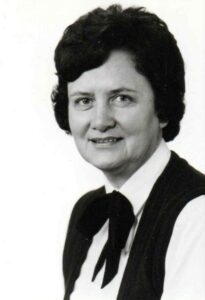In 1982, three ladies joined forces to establish Cantabile.
Pianist and piano educator Liliane Herchuelz had long dreamed of a piano competition in the Antwerp region. Her experience with her students in various competitions affirmed her belief that the interaction with other young piano players was stimulating and enriching, both for the students and for the parents and teachers.
With the involvement of Andrea Durlet and Marcella De Wettinck, “v.z.w. Cantabile” was established on December 4, 1982, and immediate efforts were made for the first Composition Competition. The awarded composition became the required piece for the finalists in the lower level of the Youth Piano Competition in 1984.

The first edition of the piano competition in 1984 was an immediate success.
During the elimination rounds on January 22 and 29, 1984, at the Centenaire Salons in Antwerp, nine finalists were selected to compete in the final on April 1, 1984, held in the auditorium of Kredietbank N.V. in the Torengebouw in Antwerp. The trend was definitively established with the Laureates’ Concert that took place on November 9, 1984, in the Rode Zaal of deSingel in Antwerp, where the first finalist from each level had the opportunity to perform with the Youth and Music Orchestra of Antwerp.
Initially, there were hardly any recitals or concerts organized. Apart from the aforementioned Laureates’ Concert, which Lions Antwerp Haven offered to the first finalists, this was mainly limited to a biennial recital in the auditorium of Bank Brussel Lambert in Antwerp.
From a few recitals and house concerts per year, Cantabile has since evolved into a broad platform for young pianists throughout Flanders.
On January 18, 1992, the tenth anniversary of Cantabile was celebrated in grand style.
In the Blue Hall of deSingel in Antwerp, laureates from past competitions performed concertos from the great piano repertoire alongside the New Flemish Symphony Orchestra conducted by Patrick Peire. Dirk Rombaut had the honor of presenting the world premiere of the second piano concerto by Marc Verhaegen, specially composed for this occasion.
In 1995, Cantabile ventured beyond national borders for the first time with a concert tour to Bulgaria.
Four laureates achieved great success with an orchestra in Sofia and Plovdiv during the concert tour in 1995. Cantabile laureates were also hosted in Bulgaria in 2000 and 2005. Upon invitation from the Belgian ambassador and Bulgarian radio, notable recitals were once again held in Sofia and Plovdiv.
Collaboration with “Jugend musiziert Nordrhein-Westfalen” resulted in exchange concerts that took our laureates to the Rhineland multiple times. Recitals in Switzerland and the Netherlands significantly expanded the international reach of Cantabile.
Since 1999, Cantabile recitals have not been limited exclusively to solo piano performances.
Through the “Chamber Music Young Flanders” project, biennial concerts are organized featuring music from various eras and contemporary compositions in diverse ensemble formations.
On September 1, 2002, the baton was passed on
After serving as the founder and chairperson of the competition for 20 years, Liliane Herchuelz passed the baton to Annie Anthonissen.
In the same year, “twenty years of Cantabile” was celebrated in grand style with the support of “Promotion of Flemish Music and Musicians” through five recitals by former laureates who were already professionally active. A well-crafted brochure was published, providing a historical overview of the Cantabile Youth Piano Competitions.
In 2007, Cantabile celebrated its 25th anniversary.
As a lasting memento of this anniversary, a CD was released. A representative selection of the award-winning compositions from our composition competition (1982-2007) was performed and recorded by 18 laureates on December 1 at “De Brug” in Lier.
At the end of 2012, our association reached the milestone of 30 years.
Dit lustrum werd op 21 april 2013 op passende wijze gevierd met een academische zitting, opgeluisterd door onze oud-laureaten Stephanie Proot en Julien Libeer, in het AMUZ – Augustinus Muziekcentrum in Antwerpen.
Elisabethwedstrijd 2012
In 2012, no fewer than four former Cantabile laureates were among the twenty-four semi-finalists of the Queen Elisabeth Competition. Such an achievement by Belgian participants was rare. Ultimately, it was Liebrecht Vanbeckevoort—who had participated in the Cantabile competition four times—who was declared a glorious laureate of the Queen Elisabeth Competition.
Compulsory pieces
Let’s not forget the composition competition, which takes place in the even-numbered years. In 2018, the compulsory piece for the piano elimination rounds was removed. However, the awarded compositions created during the final of the subsequent piano competition have become a valuable addition to the standard piano repertoire.
The 2020 Piano Competition During the COVID-19 Pandemic
In the spring of 2020, the COVID-19 pandemic disrupted the elimination rounds and the final competition. However, by adhering to the strictest health guidelines, Cantabile managed to organize a ‘shortened version of the piano competition’ in September. Kudos to the many young pianists who achieved a very high level of performance under these challenging circumstances.
In 2021, a new chairman is elected.
In 2021/2022, Stefan Van Landeghem assumed the chairmanship. He modernized our information channels to the state of the art.
Collaboration with Lions
Furthermore, the success of Cantabile is undoubtedly greatly indebted to Lions Antwerp Haven. This service club, founded almost simultaneously with Cantabile, has been offering a concert with an orchestra to the first laureate of each level from the very beginning. Needless to say, this attractive offer has persuaded many ambitious young individuals to participate.
Since 2010, the organization of the laureates’ concert, if possible even more enthusiastically, has been taken over by Lions Club Kontich.
Cantabile can now only look back with gratitude on an exceptionally fruitful period during which hundreds of piano students were given the opportunity to develop their talents.
